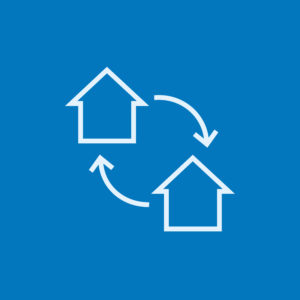1031 Exchange
Front Door Title is experienced in the 1031 Exchange process. If you’ve never heard the term, you may still know what it is. A 1031 Exchange is named after Section 1031 of the tax code, and broadly stated a 1031 Exchange is the swap of one business or investment for another of like kind. It is most frequently used in real estate.
A 1031 Exchange, (also called a like-kind exchange or a Starker) leaves you with no tax or limited tax due at the time of the exchange
Harford County Title Company
A 1031 Exchange is a rather complicated transaction, which is why you need a title company experienced in all of the ins and outs involved. If you’re considering a 1031 Exchange for your business or investment property, give Front Door Title a call today at 410-870-7070 for a consultation.
Many exchanges are delayed exchanges. Classically, a 1031 Exchange involves a simple swap of one property for another between two people. But the odds of finding someone with the exact property you want who wants the exact property you have are slim. For that reason the vast majority of exchanges are delayed, three party, or Starker exchanges (named for the first tax case that allowed them). In a delayed exchange, you need a middleman or intermediary, who holds the proceeds from the sale of your property until it is needed to complete the transfer of the property you are purchasing, the replacement property. The middleman is known as a “qualified intermediary.” This three party exchange is treated as a swap. Front Door Title has the experience you need to make a delayed exchange such as this go smoothly and keep it on schedule to stay within the 1031 Exchange rules.
In a delayed exchange, there are two key timing rules you must observe. The first relates to the designation of replacement property. Once the sale of your property occurs, the intermediary will receive the cash. You can’t receive the cash or it will violate the 1031 treatment, and the money will be taxed. Also, within 45 days of the sale of your property you must designate replacement property in writing to the intermediary, specifying the property you want to acquire.
The second timing rule in a delayed exchange relates to closing. You must close on the new property within 180 days of the sale of the old. The two time periods run concurrently. That means you start counting when the sale of your property closes. If you designate replacement property exactly 45 days later, you’ll have 135 days left to close on the replacement property.
Failure to meet the time limits means the entire gain from the sale of your property will be taxable.
Front Door Title will help you keep on schedule, and will keep careful documentation regarding the sale and exchange, so that you have everything you need to report the exchange to the IRS on Form 8824, Like-Kind Exchanges. You must file the form with your tax return for the year in which the exchange occurred.
There’s no limit on how many times or how frequently you can do a 1031. You can roll over the gain from one piece of investment real estate to another to another and another. Although you may have a profit on each exchange. you avoid tax until you actually sell for cash many years later. Then you’ll hopefully pay only one tax, and that at a long-term capital gain rate (currently 15%).
Call Front Door Title today at 410-870-7070 to schedule an appointment, or to ask any questions you may have. You can also use our contact form and someone will get back to you shortly. We are always happy to help!





